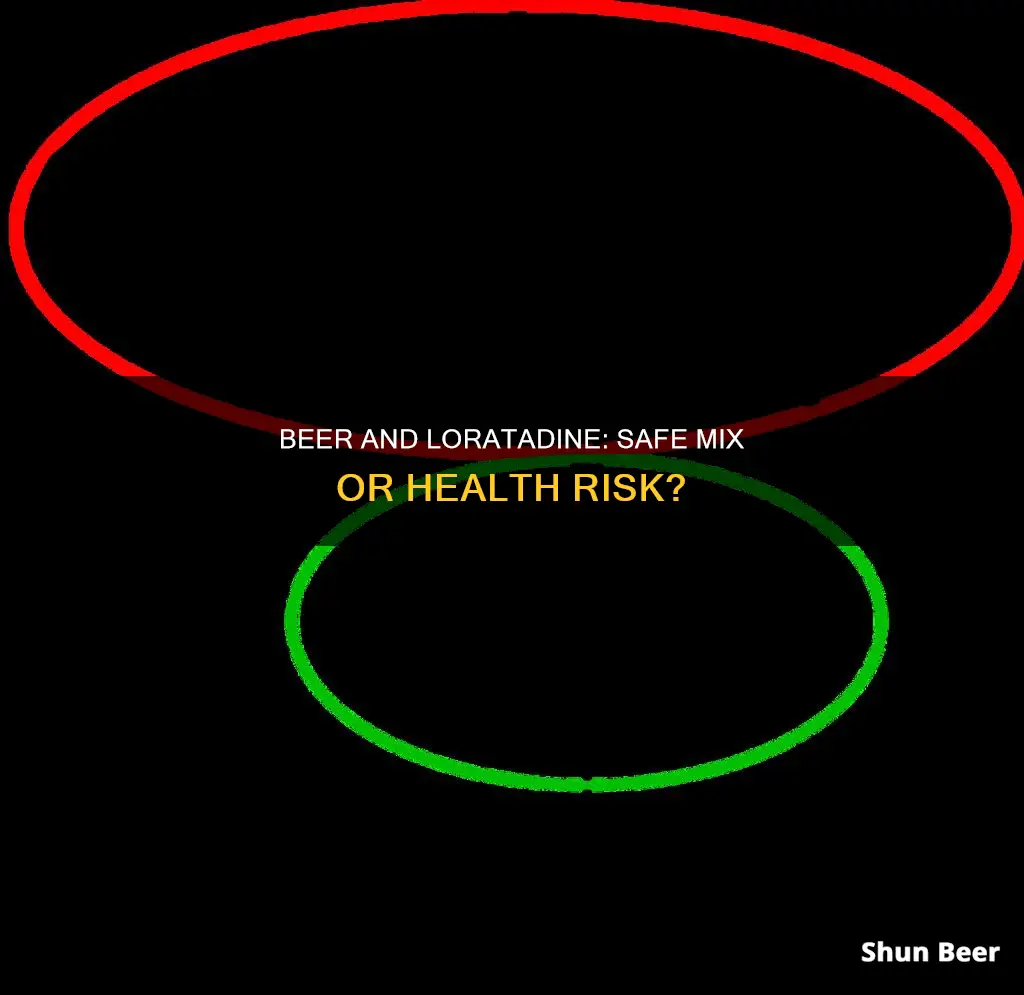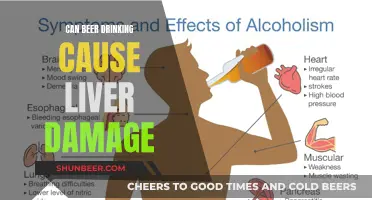
Drinking alcohol while taking antihistamines is generally not recommended. Both alcohol and antihistamines are central nervous system depressants, which can cause sedation, lethargy, and dizziness. While second-generation antihistamines like loratadine (Claritin) are less likely to cause serious side effects when mixed with alcohol, side effects such as dizziness and sleepiness are still possible. It is important to note that combining alcohol with any medication can increase the risk of serious side effects, especially in older adults. Therefore, it is always advisable to consult a healthcare professional before mixing alcohol with any medication, including loratadine, to ensure it is safe for your specific situation.
| Characteristics | Values |
|---|---|
| Should I drink beer with loratadine? | It is not recommended to mix alcohol and antihistamines like loratadine (Claritin) due to the risk of additive sedation. |
| How dangerous is it? | It is not considered life-threatening, but it can impair your ability to function and increase the risk of an accident. |
| How common are side effects? | Only a small number of individuals (around 8%) experience drowsiness with loratadine. |
| What are the side effects? | Drowsiness, sedation, lethargy, dizziness, impaired coordination, and slower heart rate. |
| How long do side effects last? | Loratadine's sedatory effects generally dissipate over the day. |
| How long should I wait to drink alcohol after taking loratadine? | The sedatory effects of loratadine are likely to dissipate after 4-6 hours. |
| Are there any alternatives to loratadine? | Nasal corticosteroids like Flonase or Nasonex are recommended alternatives for those wishing to consume alcohol. |
What You'll Learn

Loratadine is a second-generation antihistamine
First-generation antihistamines became available for general use in 1942 and are still used today. They affect the histamine receptors in the brain and spinal cord, causing sleepiness. Some examples of first-generation antihistamines include:
- Brompheniramine (Children's Dimetapp Cold)
- Dimenhydrinate (Dramamine)
- Diphenhydramine (Benadryl, Nytol, Sominex)
- Doxylamine (Vicks NyQuil, Tylenol Cold and Cough Nighttime)
On the other hand, second-generation antihistamines were first developed in the 1980s. They are considered safer because they cause less sleepiness and interact better with other medications. Some examples of second-generation antihistamines include:
- Desloratadine (Clarinex)
- Fexofenadine (Allegra)
- Loratadine (Claritin)
While second-generation antihistamines are considered safer, it is still advised to use caution when consuming alcohol with these medications as individual reactions may vary. Loratadine, in particular, is not associated with performance impairment when taken at recommended doses. However, it is always best to consult a healthcare provider to ensure the information applies to your personal circumstances.
Beer Distribution in Pennsylvania: A Unique System
You may want to see also

It is rare for loratadine to cause drowsiness
Loratadine, also known by the brand name Claritin, is a second-generation antihistamine. This class of antihistamines is known for having a lower risk of causing drowsiness compared to first-generation antihistamines. While drowsiness is a possible side effect of taking loratadine, it is considered rare.
A study referenced in the Canadian prescribing information for Claritin concluded that loratadine does not increase the effects of alcohol. The study found that the ability of healthy male volunteers to concentrate was not impaired by either 40 mg of loratadine alone or in combination with 0.75 g/kg of alcohol.
However, it is important to note that both alcohol and antihistamines are central nervous system depressants, and combining them can increase the risk of sedation, lethargy, and dizziness. Therefore, it is generally not recommended to mix alcohol and antihistamines, including loratadine.
If you are taking loratadine and are concerned about the potential for drowsiness, it is best to consult with your healthcare provider for personalized advice. They can advise you on the potential risks and benefits of mixing alcohol with loratadine and provide guidance based on your individual circumstances.
Additionally, it is worth mentioning that individual reactions to medication can vary. Even though loratadine is considered less likely to cause drowsiness compared to other antihistamines, some people may still experience this side effect. Therefore, it is always a good idea to understand how a medication affects you before consuming alcohol with it.
Beer and Leaky Gut: What's the Connection?
You may want to see also

Alcohol and loratadine are both central nervous system depressants
The impact of mixing alcohol and loratadine can vary depending on individual factors, such as age, gender, and medical history. Women and older adults, for example, are more likely to experience serious alcohol-medication interactions. Additionally, certain medical conditions, such as alcohol use disorder, can further influence the effects of mixing alcohol and loratadine.
While loratadine is a second-generation antihistamine, which is generally associated with a lower risk of drowsiness compared to first-generation antihistamines, it can still cause drowsiness in a small percentage of individuals. If loratadine has a sedating effect on you, consuming alcohol in combination with this medication will likely lead to increased sedation.
Furthermore, mixing alcohol and loratadine can affect your heart rate, making it harder for your heart to pump blood effectively throughout your body. It can also impact your coordination and motor skills, increasing the risk of accidents or injuries.
The combination of alcohol and loratadine can also increase the risk of an alcohol overdose. When both substances are present in your system, your liver takes longer to process them, potentially leading to higher levels of alcohol in your bloodstream.
It is important to note that the effects of mixing alcohol and loratadine may not be limited to the period when both substances are actively in your system. Loratadine, for example, can have residual effects for up to four days after stopping daily use. Therefore, it is advisable to consult a healthcare professional to understand the full extent of potential interactions and risks associated with mixing alcohol and loratadine.
Beer and Keto: What's the Verdict?
You may want to see also

Loratadine may interfere with how your liver processes alcohol
Loratadine, also known by its brand name Claritin, is a second-generation antihistamine. It is used to treat upper respiratory symptoms such as red, watery, or itchy eyes and itching in the nose, mouth, or throat. These symptoms are often caused by allergens such as pollen or dust.
While loratadine is considered a safer option when combined with alcohol compared to first-generation antihistamines, caution is still advised. Loratadine may interfere with how your liver processes alcohol, increasing the risk of an overdose if you drink too much.
The liver is responsible for breaking down and removing both loratadine and alcohol from the body. When these two substances are combined, the liver may take longer to process them, leading to a higher level of intoxication and an increased risk of alcohol overdose.
In addition, both loratadine and alcohol can slow down the central nervous system (CNS), causing sedation, lethargy, and dizziness. Although loratadine is less likely to cause drowsiness compared to first-generation antihistamines, the combination of loratadine and alcohol may enhance these side effects.
It is important to note that individual reactions may vary. While some people may not experience drowsiness with loratadine, others may find that the combination of loratadine and alcohol leads to increased sedation. Therefore, it is generally recommended to avoid or limit alcohol consumption when taking loratadine.
If you have concerns or questions about consuming alcohol while taking loratadine, it is best to consult your healthcare provider. They can provide personalized advice and recommend alternative treatments if needed.
Exploring Galveston Beach: Can You Enjoy Beer There?
You may want to see also

Loratadine is the brand-name version of the drug, Claritin
As an antihistamine, loratadine works by preventing histamine from binding to histamine receptors in the body, thus stopping allergy symptoms. Histamine is a chemical that is released by the immune system when it identifies an allergen as a dangerous intruder.
While loratadine is generally safe, with a low risk of serious drug interactions, it may be unsafe to consume alcohol while taking this medication. This is because both alcohol and loratadine are central nervous system depressants, and can cause sedation, lethargy, and dizziness. Combining them can increase the risk of these effects, although this is more common with first-generation antihistamines such as Benadryl.
That being said, a study referenced in the Canadian prescribing information for Claritin concluded that loratadine does not potentiate the effects of alcohol in individuals. The study found that the ability of healthy male volunteers to concentrate was not impaired by either 40 mg of loratadine alone or in combination with 0.75 g/kg of alcohol.
Additionally, loratadine is relatively non-drowsy for most individuals, with only around 8% of people reporting any sedation when taking the drug. If loratadine does not make you drowsy, it may be safe to drink alcohol in moderation. However, if you are in the small percentage of people who experience drowsiness as a side effect of loratadine, drinking alcohol will likely increase sedation.
It is important to note that everyone reacts differently to medications and alcohol. If you have just started taking loratadine, it is best to avoid alcohol until you know how it affects you. If you have any concerns or questions about mixing alcohol and loratadine, it is always a good idea to consult your healthcare provider.
Drinking Beer in Your Car: Pennsylvania's Laws
You may want to see also
Frequently asked questions
It is not recommended to mix alcohol and antihistamines like loratadine (Claritin) due to the risk of additive sedation. However, only a small number of individuals experience drowsiness with loratadine. If you are in the small percentage of people where loratadine does cause drowsiness, drinking alcohol will likely cause more sedation.
Both alcohol and loratadine are central nervous system depressants and can cause sedation, lethargy, and dizziness. When combined, these effects can be dangerous.
If you are taking loratadine and want to drink alcohol, it is best to consult your healthcare provider to make sure it is safe. They can also discuss other treatment options with you.







